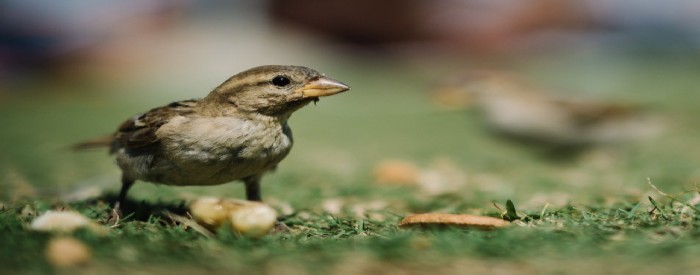Birds are beautiful creatures that we all love. But just like even the loveliest kid’s crying gets a little annoying after a certain point- so do birds. Birds get especially annoying when they come after the seeds you just planted! Honestly, imagine spending a long time researching and then finally carefully planting your seeds. Next, imagine a flock of birds descending to eat all your seeds! And that’s precisely it’s important to know How to Keep Birds From Eating Grass Seeds!
Quoting Weekand:
Birds are a boon in the yard, eating pests and brightening your day with their songs and pretty colors, but you don’t want them hanging around when you’ve just sown grass seeds. The tiny seeds are food for many bird species, and even if the birds don’t eat the seed, they can ruin your new lawn by taking dust baths in the finely raked soil.
Today, here at Turf Mechanic, we’re going to learn about it. We are going to take a look the possible methods that you might be looking at in order to keep the birds form eating grass seeds that you planted!
How to Keep Birds From Eating Grass Seeds that you planted? Begin with reading this article!
How to Keep Birds From Eating Grass Seeds?
While birds might be beautiful to look at, it’s essential to save your seeds if you want a good lawn! So, it becomes really important to discuss what methods you might use in order to keep your seeds safe from these birds.
Well, there are quite a few methods out there, and honestly, all of them are reasonable. You might just choose to go for the one that you think fits your present situation the best, because some of them (naturally) are better suited for specific situations than the others.
So, here are some of the best methods that you might want to go for:
Protecting the Grass
The method that you might want to opt for to not make your lawn look awkward is this one. Yeah, some of the other methods on this list do kind of humiliate your lawn, so this one is a little safe.
So, in this case, you try to protect the grass seeds by actually placing something on them so that the birds either cannot notice them, or get to them, or at least have some difficulty in doing so. There are generally two methods followed by the experts for this:
- The first one is using straw, if you just put straw all over the place after planting and watering the seeds, it does a lot of things at the same time. First, it actually makes the place hold water for longer. Next, it also makes it harder for the birds to spot and to get the seeds, making your seeds a little safer.
- The second one is using a plastic sheet, You might just use this method if the temperature is not too high. If you can use this method, the seeds are going to be perfectly safe because the birds can’t get to them. However, you can’t actually use this method if the temperatures are higher. This is so because the seeds won’t survive the heat if you keep them covered in higher temperatures like that.
Deterring the birds
Next, you might want to actually deter the birds from invading your seeds. This should not be too hard, because birds are easily scared of moving and noisy things. You can actually put up things in your lawn that move, such as children’s windmills and brightly colored flags.
Again, you can also go for the noisy options to scare the birds away, such as wind-chimes! You can place these in the garden, and hope that the birds will be shooed away!
Quoting Yard Care Gurus:
None of these techniques are pretty, and you may get some strange looks from neighbors.
Keeping them up for at least four weeks, however, is necessary for successful germination. Additionally, while each can be effective on their own, the best way to ensure success is to employ several of them at the same time and to rotate them often.
Scaring the birds away entirely!
Now, sometimes, you might actually want to get real serious. Well, there are a few tricks that you might try out, which might actually just work and scare the birds off your lawn!
To begin with, you might actually use something like a plastic snakes that looks real-like. The birds might mistake it for a real one in your lawn, and that’s exactly what you want. If they do so, they are certainly going to remain off your lawn.
You might also use something other than snakes, such as a model of a hawk or some other predatory bird. All you have to do, is give them a reason to be scared of coming even close to your seeds. If you can keep up this ploy, and move these once in a while and be careful about it, you might just keep your seeds safe until your grass is ready.
Bird Repellent: Doing it the professional way.
Again, you might entirely shift to different products specially made keeping your problem in mind. There are certain seeds available that come covered in a coating that birds don’t like the taste of. This ensures that they will not go after the seeds that you have planted, giving them the safety you want.
So, if you are just lazy like me, or if you just want to be free of the hassle, this might just be the best choice for you!
Alternative strategy: Using more seed
Now, these are the several methods that you can use the scare the birds away. But I am sure that there are several ones among you that really do not want to scare the birds away, or want a good lawn WHILE feeding the birds.
Again, there must be some of you who are just as lazy as me, who really don’t want to do anything, but want to get a good lawn anyway. Well, what if I tell you I’ve found the solution to all of these problems for you?
The best idea, in a case like that, is to actually use extra seeds. You might want to use about one and half times the regular amount (yes, 50% extra), to ensure that the seed is enough to let them have their fill without actually hampering your lawn’s look.
Some experts also recommend creating other diversions.
Sometimes, the birds are persistent, and you might get frustrated with constantly trying to deter them. If worse comes the worse, one of the best methods of keeping birds from eating grass seeds is to give them something else to do. Hang up a few bird feeders on the opposite side of your lawn. Birds are attracted to bird feeders. They also love bird baths!
So, you might also want to use this method if you’re planning to let them have their fill. You must, however, keep in mind that the seeds you place in the feeder will be finished pretty soon. You must refill it from time to time to ensure that the birds don’t start to feed from your lawn.
The lawn is ready? Keep this in mind!
Once the lawn is ready, it might be really tempting to jump into it, after all, you’ve worked so hard. And that’s perfectly alright, but there’s one thing you might continuously find yourself asking.
Why Does Grass Make You Itchy?
Well, there’s no reason for you to worry, because we have already answered this question for you, please don’t forget to read our article on Why Does Grass Make You Itchy?
We have explained in this article the reasons as to why you might feel the itchiness, as well as the symbols you must be on the lookout for. We have also explained how you might be able to avoid some of the potentially hazardous scenarios, so don’t forget to take a look at it!
Turf Mechanic is here for you!
If everything goes well, then the birds should not come for the seeds you sowed. So, if it all goes as planned, namely, if the birds actually don’t come for the seeds you sowed, then, mission successful!
Thank you for taking your time to read this article till the very end. We really hope that you actually learned something that you might be able to put into use. We understand that you might still have a few questions for us, and we look forward to hearing them from you! So, should you have any queries, please do not hesitate to reach out to us, we are here for you!
Finally, we thank you once again for reading this article till the end. We hope to see you on our upcoming articles, and until then, Turf Mechanic takes your leave.

